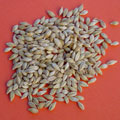Dr. Perricone's No. 3 Superfood: Barley

This ancient grain is sadly overlooked by today's culinary trendsetters, yet it is one of the grains with the greatest health benefits, delightful flavor and versatility. Barley can be used as a delicious breakfast cereal, in soups and stews and as a rice substitute for dishes such as risotto.
Not only is barley a low-glycemic grain, it is high in both soluble and insoluble fiber. Soluble fiber helps the body metabolize fats, cholesterol and carbohydrates, and lowers blood cholesterol levels. Insoluble fiber—commonly called "roughage"—promotes a healthy digestive tract and reduces the risk of cancers affecting it (e.g., colon cancer).
Dietary fiber is critical to health—yet few people in our modern society even come close to the recommended daily intake. Many experts believe that good health begins in the colon, and without sufficient dietary fiber in the diet, we run the risk of a host of diseases, ranging from hemorrhoids to colon cancer.
The fiber found in barley provides food for the beneficial bacteria in the large intestine. This is important as the "good" bacteria can crowd out the disease-causing bacteria in the intestinal tract, resulting in greater health and disease resistance.
Barley is sold in many forms, all of which are nutritious. But hulled barley, in which the outer hull (the bran) is left intact, is richer in fiber and contains more fiber and nutrients than other forms, such as pearl barley or Scotch barley.
Eating hulled barley on a regular basis:
Not only is barley a low-glycemic grain, it is high in both soluble and insoluble fiber. Soluble fiber helps the body metabolize fats, cholesterol and carbohydrates, and lowers blood cholesterol levels. Insoluble fiber—commonly called "roughage"—promotes a healthy digestive tract and reduces the risk of cancers affecting it (e.g., colon cancer).
Dietary fiber is critical to health—yet few people in our modern society even come close to the recommended daily intake. Many experts believe that good health begins in the colon, and without sufficient dietary fiber in the diet, we run the risk of a host of diseases, ranging from hemorrhoids to colon cancer.
The fiber found in barley provides food for the beneficial bacteria in the large intestine. This is important as the "good" bacteria can crowd out the disease-causing bacteria in the intestinal tract, resulting in greater health and disease resistance.
Barley is sold in many forms, all of which are nutritious. But hulled barley, in which the outer hull (the bran) is left intact, is richer in fiber and contains more fiber and nutrients than other forms, such as pearl barley or Scotch barley.
Eating hulled barley on a regular basis:
- Lowers blood cholesterol levels
- Protects against cancer because its high fiber content helps speed food through the digestive tract, and because its a good source of selenium, shown to significantly reduce the risk of colon cancer
- Is a good source of niacin, the B vitamin that is cardio-protective
- Slows starch digestion, which may help keep blood sugar levels stable
- Provides high concentrations of tocotrienols, the "super" form of vitamin E
- Provides lignans, phytochemicals that function as antioxidants. Women who consume lignans (also present in high levels in flaxseed) are less likely to develop breast cancer.
As a reminder, always consult your doctor for medical advice and treatment before starting any program.



